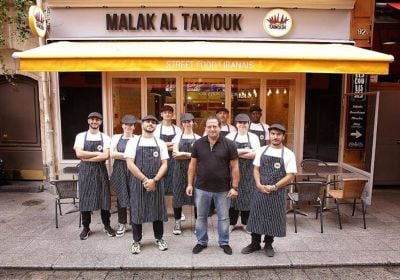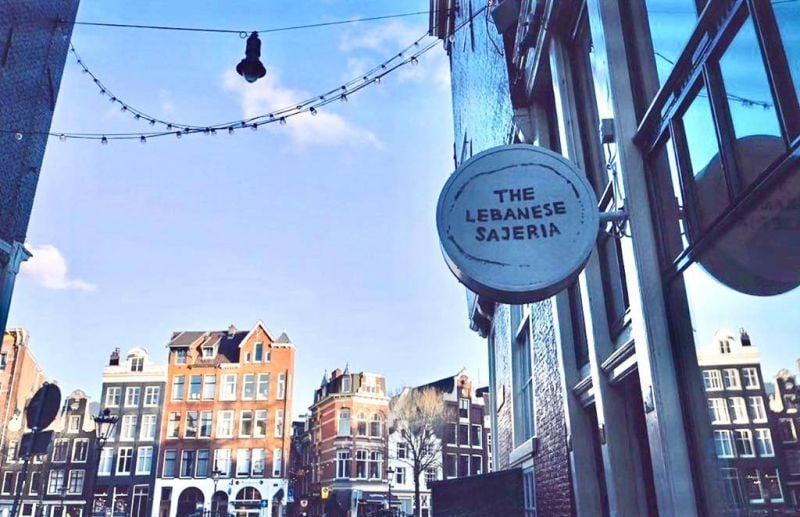
The first location of The Lebanese Sajeria in Amsterdam’s famous Negen Straatjes, located in the Grachtengordel, a UNESCO World Heritage Site. (Credit: Farah Silvana-Kanaan/L'Orient Today)
This might seem like a story about how two Lebanese expats in Amsterdam created a small empire of saj. But it’s so much more than that.
It’s a love story of fate and tenacity, but most of all, it’s about following your dream, even if that dream starts out of the trunk of a car.
This story begins in Austria, where a 19-year-old dancer sold all her jewelry to travel the Middle East with a dancing troupe. One night, while she was performing on stage, a Lebanese engineer seated in the crowd was struck by the sight of her.
Their love was to span different continents, countries, cities and cultures – culminating in the exquisite taste of home.
“The relationship between my Austrian grandmother and my Lebanese grandfather was, of course, a bit controversial,” recounts Lia Satzinger from the office above The Lebanese Sajeria in the heart of Amsterdam.
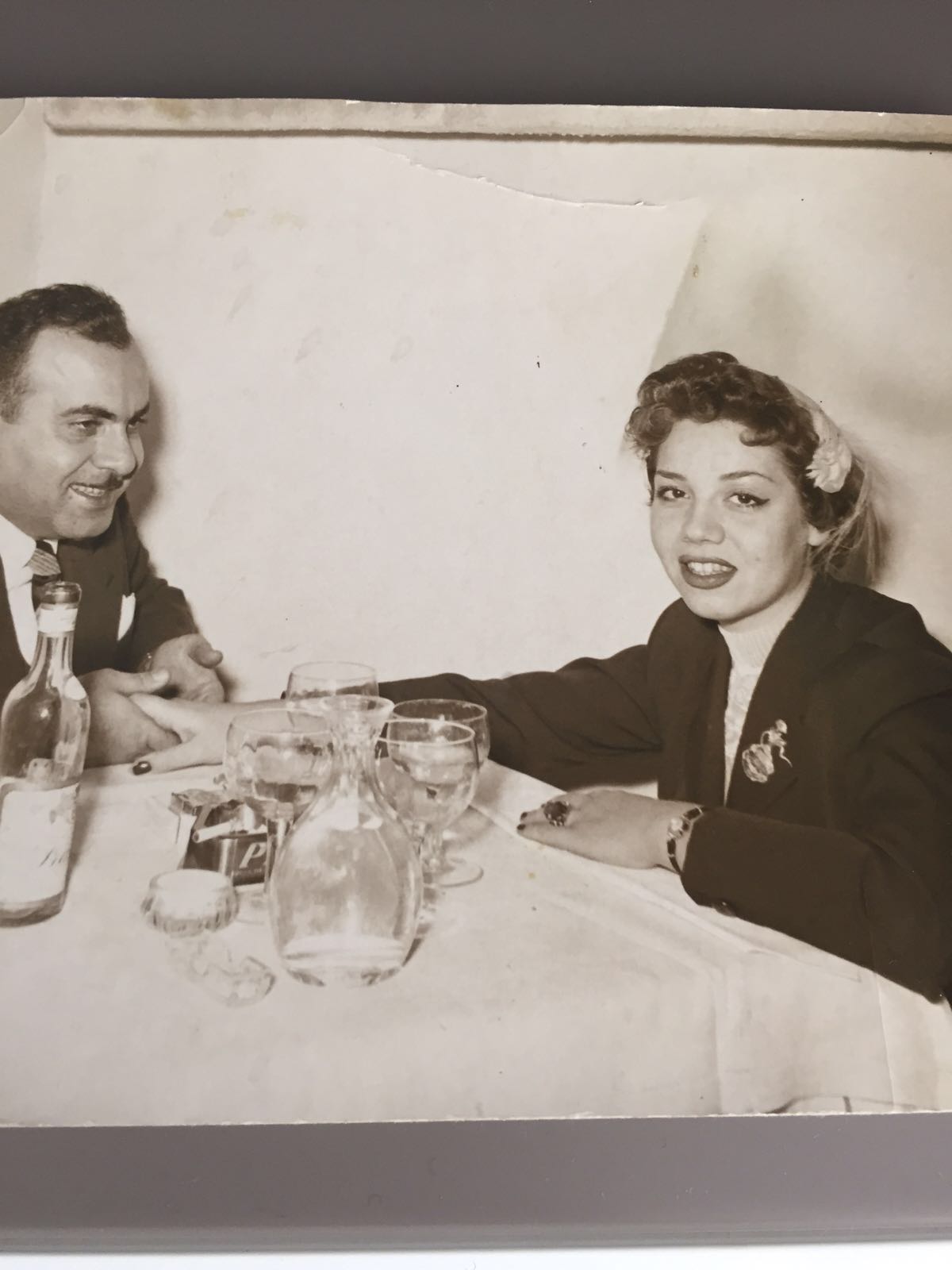 Lia’s Lebanese grandfather and Austrian grandmother. (Courtesy of Lia Satzinger)
Lia’s Lebanese grandfather and Austrian grandmother. (Courtesy of Lia Satzinger)
One half of the dynamic duo behind the successful concept, Satzinger is the granddaughter of the adventurous couple that roamed the Middle East, for work and pleasure, based out of a house in Achrafieh.
Ziad Mansour, Lia’s partner in both love and saj, was raised in the same neighborhood but left Lebanon for a finance job in Amsterdam in 2007.
“I met Lea and one day [in 2015], while we were sitting on the grass at a Sunday market eating falafel … we wondered out loud why no one [in Amsterdam] is doing manoushe.”
With that, the seed was planted in their minds.
Humble beginnings
On a trip to Lebanon that same summer, they bought a small DIY electric saj maker, thinking they would start out with a small market stall.
To gauge interest and test flavors, they organized a saj tasting party for friends in their garden. The zaatar halloumi was the unequivocal favorite.
“After that, we just went for it,” Ziad says.
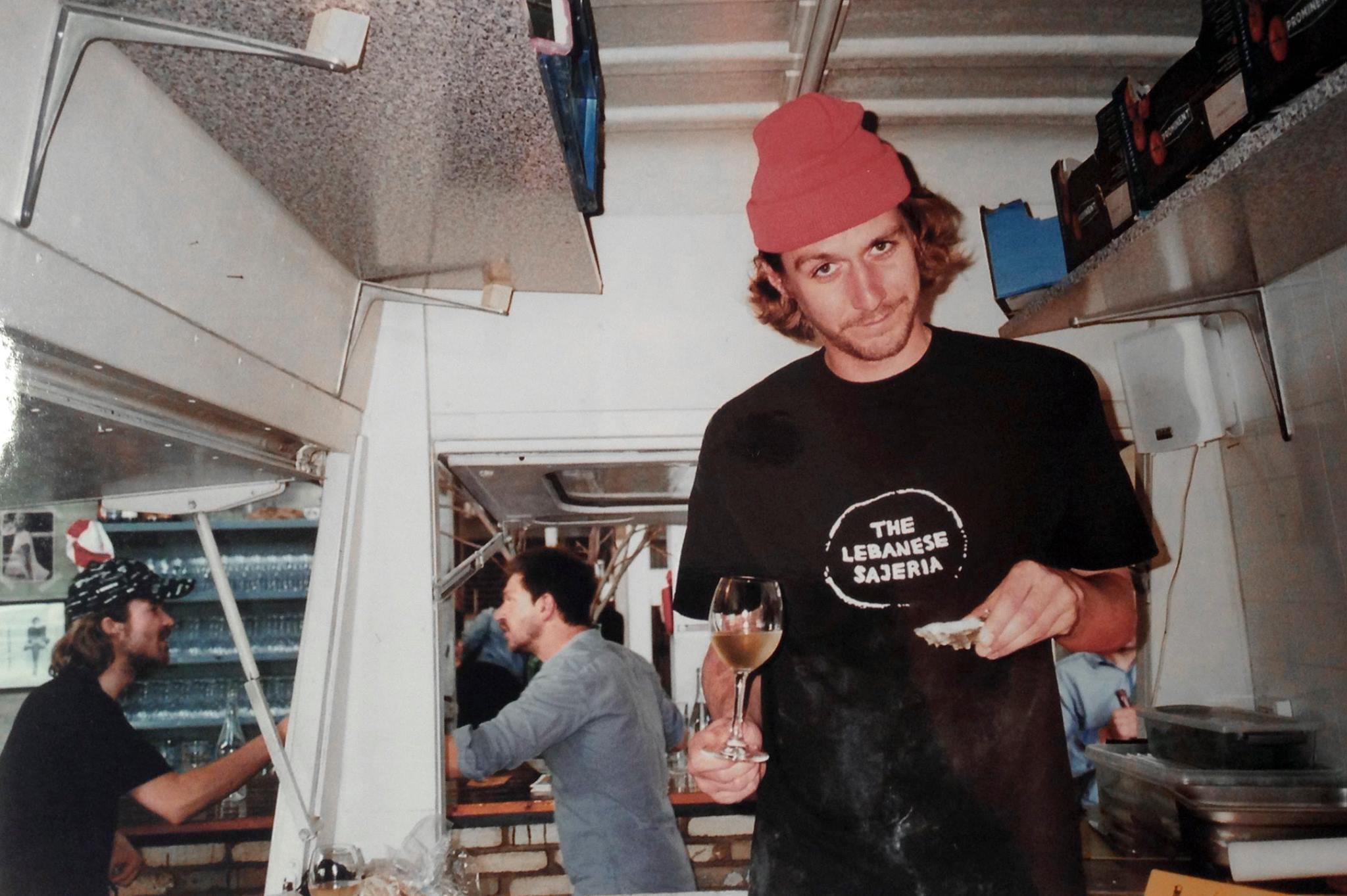 Friends and classmates helped Lia and Ziad run the business during The Lebanese Sajeria's early days as a food truck. (Courtesy of Lia Satzinger)
Friends and classmates helped Lia and Ziad run the business during The Lebanese Sajeria's early days as a food truck. (Courtesy of Lia Satzinger)
The couple booked a stall for the next Sunday morning, picking mint and grating cheese by hand.
“I was flattening the dough until two in the morning,” recalls Lia, almost collapsing in laughter. “[I was] in heels because I wasn’t tall enough to reach the counter!”
On Sunday morning, they shuttled materials back and forth to the market with their small rental car. Looking at their neighbor, who was making pizzas in a semi-professional setup, they felt intimidated.
“We thought, ‘What are we doing here? Maybe we should go home and forget about the whole thing,’” Ziad says. “Little did we know we would have a queue lined up from the minute we opened.”
By 2 p.m. they were completely sold out. “You know, it’s the smell of the za’atar,” says Ziad.
Eager to source their tools directly from the homeland, they bought actual saj-makers on their next trip to Lebanon, along with gas bottles and a massive amount of spices
“All our clothes smelled like za’atar and sumac for ages,” Lia recalls.
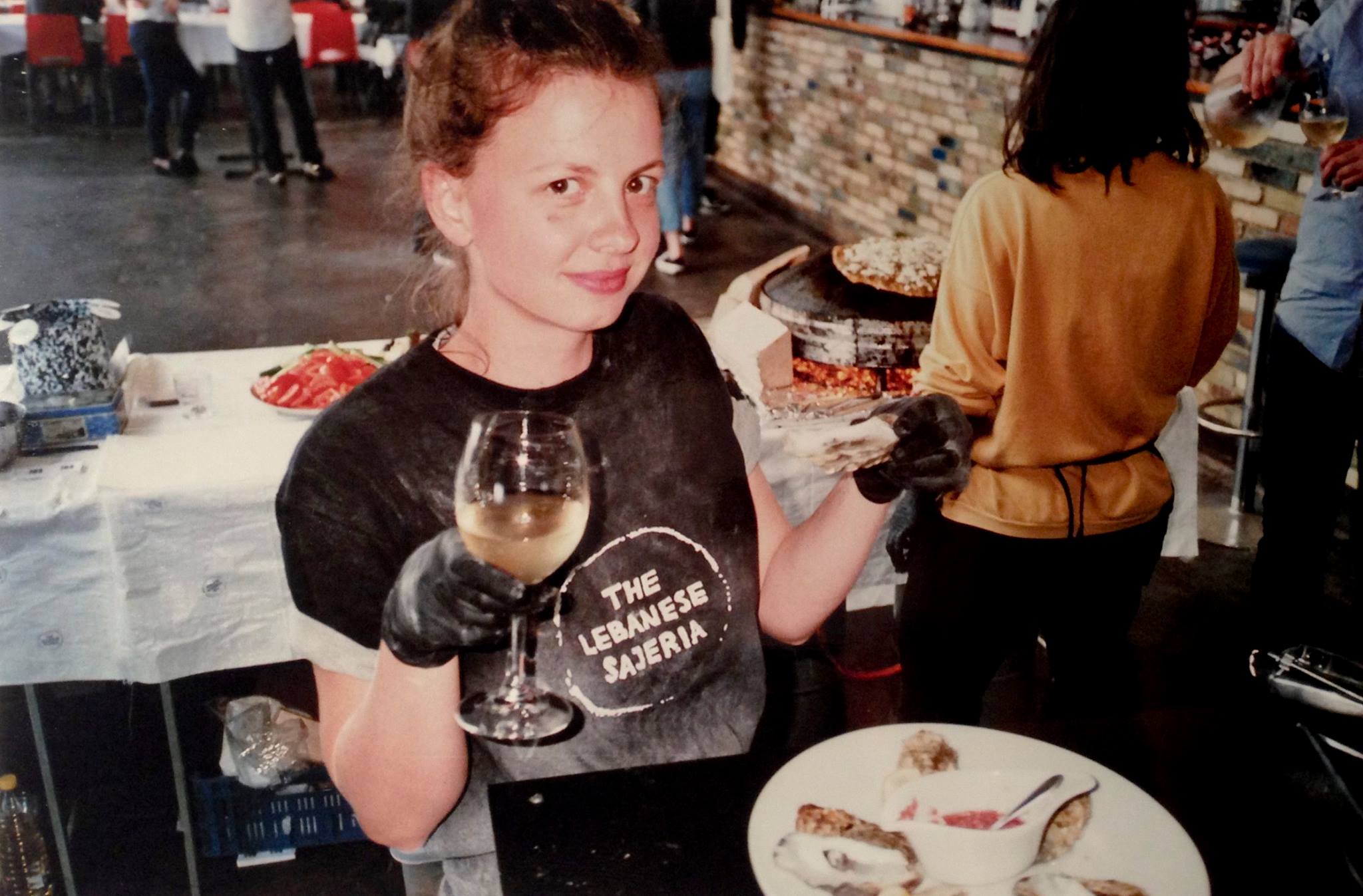 An early employee of the Lebanese Sajeria. (Courtesy of Lia Satzinger)
An early employee of the Lebanese Sajeria. (Courtesy of Lia Satzinger)
At the next market, they made twice as much saj and sold out again. After that season, they realized their operation had outgrown its humble beginnings. Ziad began looking for storefronts to rent in Amsterdam.
“The saj had to fit in the window,” Ziad says, so customers would be tempted by the sight of saj and the scent of the za’atar.
“When we opened the location. I was still working [my finance job] for the first month, so I would come in early, already wearing my suit, and help with the dough,” Ziad says.
“All the people working with us were artists, fellow students from my university ... Some artists designed the menu, others did the woodwork,” Lia adds. It was the same community. We invited them all to our wedding in Lebanon two years later.”
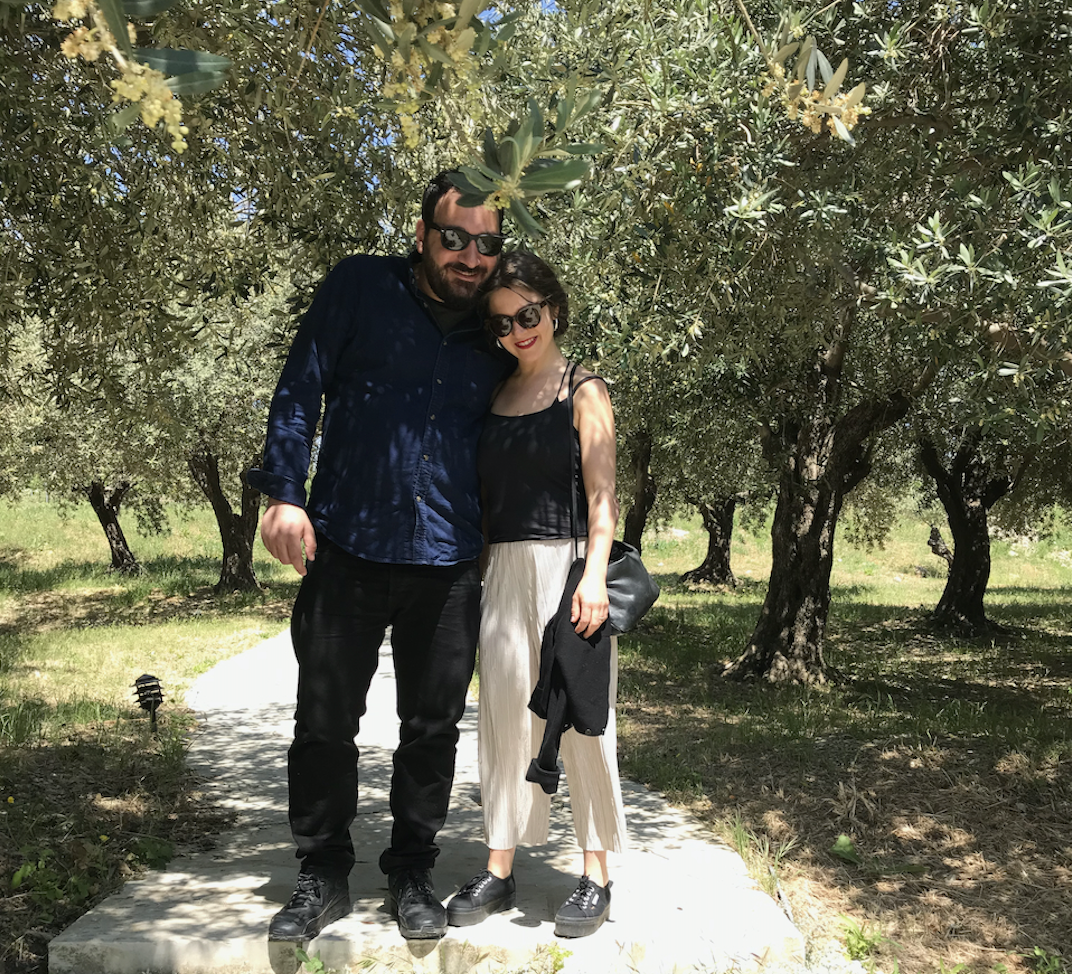 Lia Satzinger and Ziad Mansour, owners of The Lebanese Sajeria. (Courtesy of Lia Satzinger)
Lia Satzinger and Ziad Mansour, owners of The Lebanese Sajeria. (Courtesy of Lia Satzinger)
Community, simplicity and sustainability
Today, their Sajeria has expanded to include three locations and two cooks who work alongside Lia. But no matter how big they grow, Lia and Ziad manage to stay rooted.
“My mother is one of the most patriotic Lebanese people I know," says Lia. “She was pulled away from her home country when she was 14, so she was always pushing: you are not Austrian, you're Lebanese!”
But it was the kitchen in Lia's grandparents' house that instilled in her a love of cooking, particularly Lebanese food.
“To me, their kitchen was the safe place, and they loved to cook ... When [my grandfather] was traveling around the Middle East for work, he would collect recipes everywhere,” Lia says. “Our food is Lebanese with a twist. That’s just my background because I’m not fully Lebanese and that’s reflected in the recipes.”
“I personally believe in the evolution of recipes,” she adds.
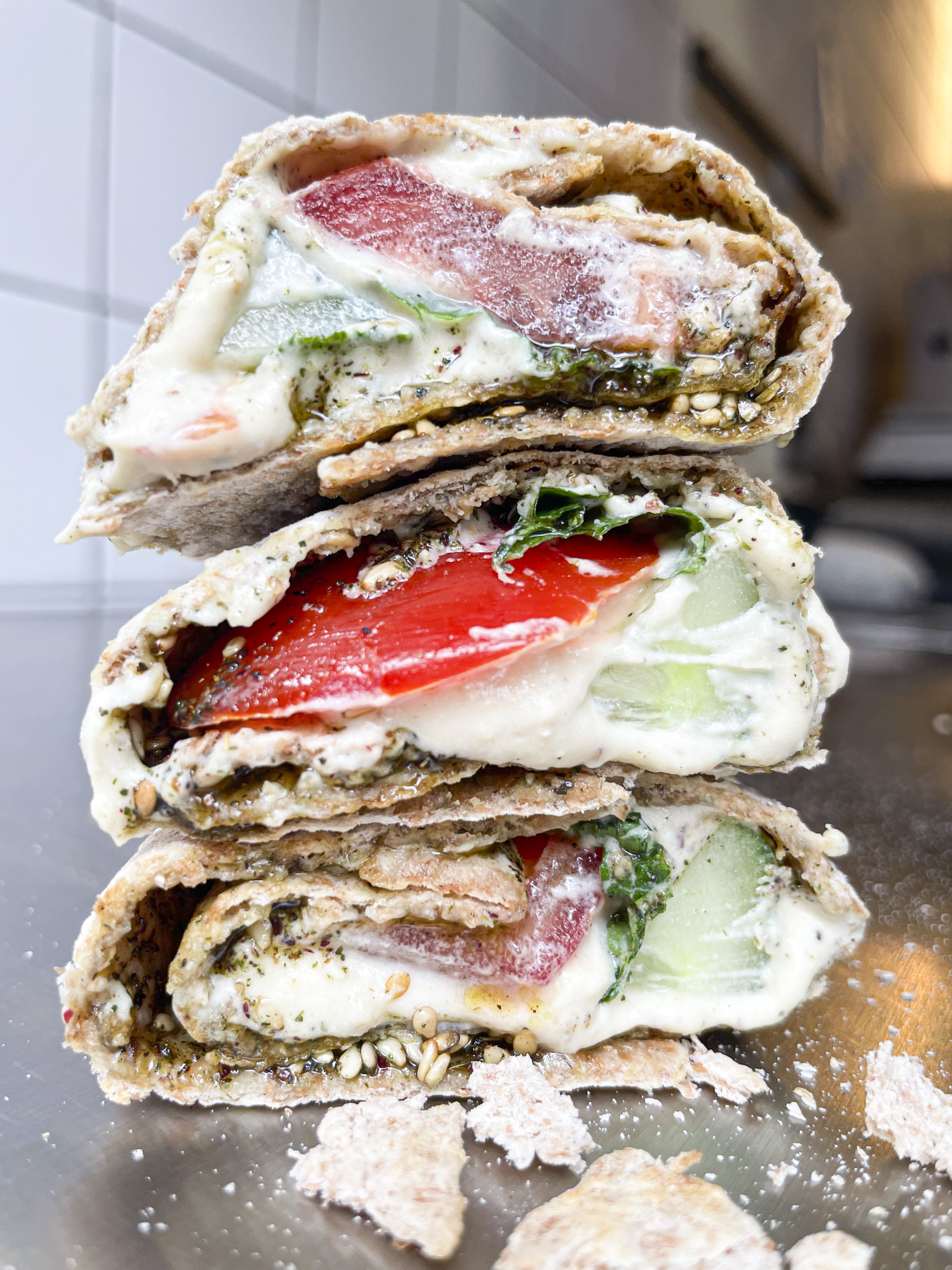 The Za'atar Hummus Manouche, made with crunchy sourdough, Lebanese za'atar, hummus, tomato, cucumber, fresh mint and olive oil. (Courtesy of Lia Satzinger/The Lebanese Sajeria)
The Za'atar Hummus Manouche, made with crunchy sourdough, Lebanese za'atar, hummus, tomato, cucumber, fresh mint and olive oil. (Courtesy of Lia Satzinger/The Lebanese Sajeria)
The two emphasize community, simplicity and sustainability.
“We really aim to keep our menu quite minimal, we don't want to over-expand,” Lia says. “It’s tempting, of course. But we try to always pull ourselves back to basics.”
They pride themselves on “only using the best ingredients,” Lia says.
“Many restaurants, excluding Michelin restaurants, use ready-made products. And we don't have one single ready-made thing in this place. Sure, it's cheaper, but … you don’t taste any life in it,” Lia says.
Despite their penchant for ready-made ingredients, Lia has a soft spot for the Dutch culinary spirit. “I find they're extremely open to new things,” she says.
In fact, their saj has become so popular that they’ve had to deal with several copycats elsewhere in Amsterdam.
“Our employees went undercover to try it. But guess what [the other restaurant] did? They put pesto inside the za’atar wrap!” Lia recounted with horror.
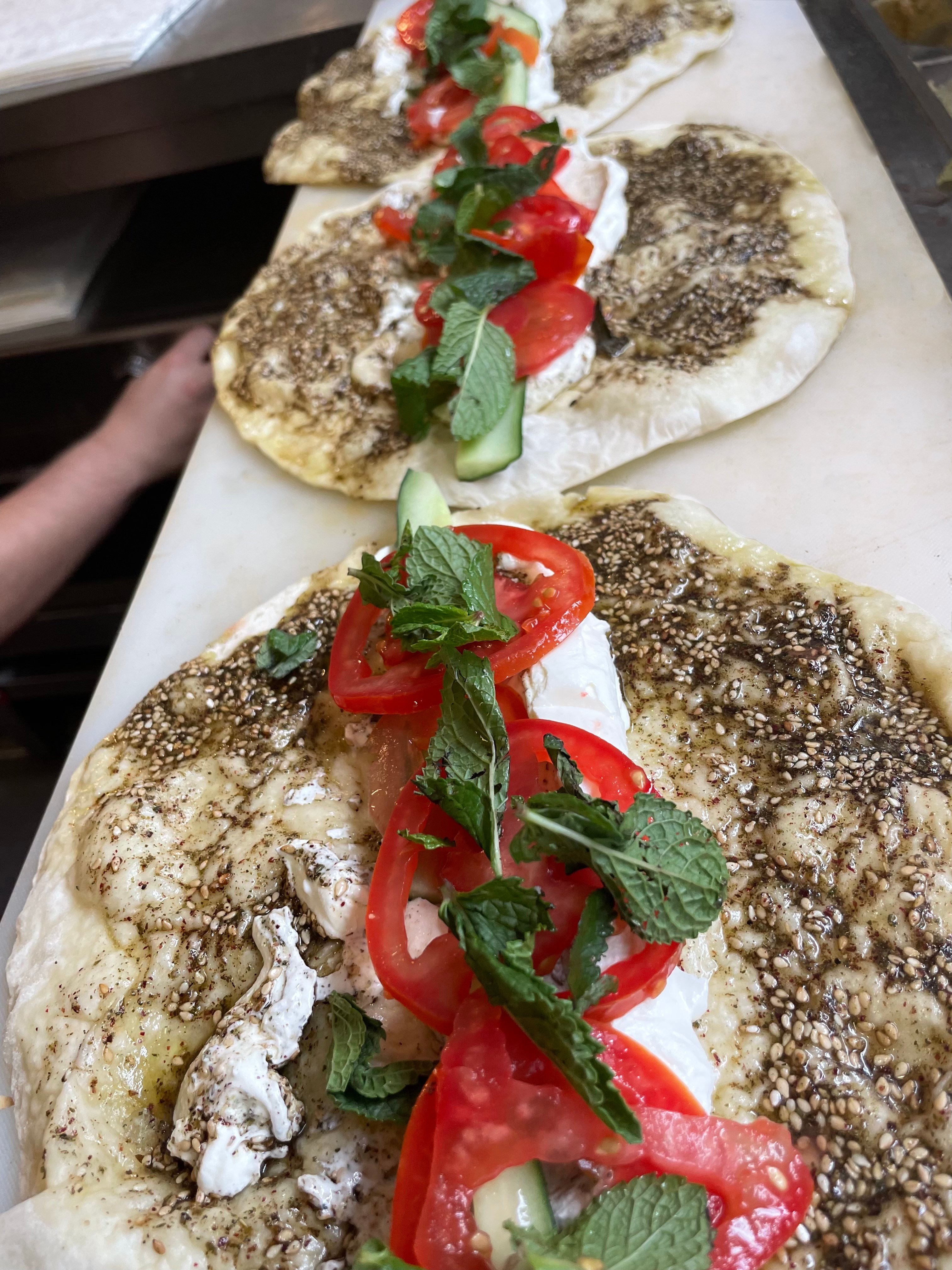 Za'atar and Labne from The Lebanese Sajeria. (Courtesy of Lia Satzinger/The Lebanese Sajeria)
Za'atar and Labne from The Lebanese Sajeria. (Courtesy of Lia Satzinger/The Lebanese Sajeria)
So what’s next for the saj whisperers?
“We're now working on a few retail items,” Lia says, referring to a product line that includes za’atar, sumac and fig jam. While they don’t stuff their suitcases with za’atar anymore, all the products are made in Lebanon and shipped to the Netherlands.
“Our za’atar comes from a famous farm in the Bekaa, our tahini is from Al Yaman,” Ziad says.
There are not many Lebanese in Amsterdam, so Lia and Ziad understand the importance of representing saj in such a multicultural city.
“We even put Lebanese in our name! You can’t get much prouder than that,” says Ziad.
Their emotional bond to the homeland is so strong that their (“hopefully early”) retirement plan is to buy a farm in the Lebanese mountains.
“We’d go back tomorrow,” Lia says, “but that’s not possible.”
“Lebanon is pretty magical, as long as you don't have to worry about making a living. So, the way we see it now is: let’s get this done,” Ziad says with a sigh.
“One day, the sea and the mountains will be waiting for us.”
